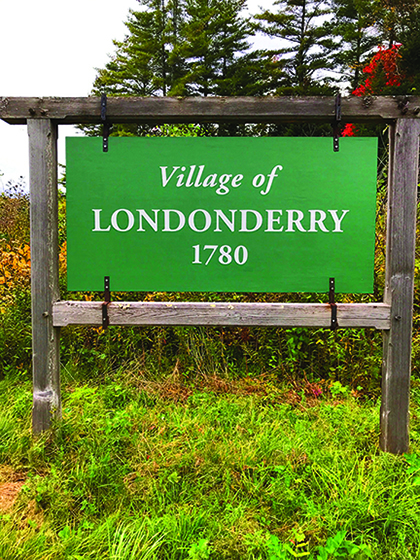
LONDONDERRY, Vt. – At the Nov. 4 meeting, the Londonderry Selectboard discussed a long-term community recovery plan with the FEMA assistance group, requested interim funding from the cemetery commission for the town office renovation project, and approved a motion to submit a FEMA hazard mitigation grant program buyout application.
Mark Leese, a planner on the FEMA Community Assistance Group, explained to the board that a long-term recovery plan helps get everyone on the same page about what they want as a vision for the future, and prepares the town to submit grant applications more effectively. Leese expressed the plan is “a giant letter of support” from the board, and urged them to start working on putting together a committee to assist in creating a recovery plan for the town.
Leese went over an ideal scenario for the process. The first step is to set up a steering committee with “reasonable people that can work together,” and have them meet every few weeks for approximately six to eight months to complete a plan. The town would host three public meetings in that time, where the recovery plan committee would present ideas, and the community would share issues and desires. The second meeting would allow the committee to present a draft of the plan with boards, exhibits, and a Q&A, and the third meeting would be a final presentation to the selectboard.
Kelly Pajala expressed, “It’s more than just a flood recovery plan.”
“It’s a vision for the future,” Board Chair Tom Cavanagh concurred.
The board agreed the committee should have one or two selectboard members, someone from the planning commission, housing commission, and others.
The town office renovation project is beginning to incur expenses. Town administrator Shane O’Keefe recommended the board request interim funding from the Londonderry Cemetery Commission, as they have in the past. It is easier to borrow internally, O’Keefe explained, and could save some time and lower the interest the town would pay a bank. Currently, the town is covering fees with their internal reserve funds. The previously approved bond loan was for $1.3 million, with an overall cost projected to be $1.8 million. The Cemetery Commission agreed to the construction loan, stating they would need incremental payments from the town.
The board moved to discuss the Municipal Energy Resilience Program (MERP), which is a $500,000 grant the town is trying to obtain for the office building renovations to help cover the extra expenses. This would help “button up” the building with insulation, windows, and a membrane over the dirt floor basement. O’Keefe said the state and regional planning commissions are working to get them a response, but he was optimistic they would get the grant.
The board also approved a change order for the town office, with the recommendation from the project architect and engineer, for $5,965 to repair horizontal and vertical cracks in the foundation.
The FEMA Hazard Mitigation Grant Program has reported to the town that they are not going to fund elevation or flood proofing projects. Their main priorities are buyouts. The homeowners at 74 Main Street, who previously submitted a preapplication for elevation, requested to move forward with a buyout application.
O’Keefe explained that FEMA buyouts become vacant, elevated, town-owned properties, which have permanent deed restrictions from any development on the site. This eliminates any future flood hazard on the site, but also takes the property off the town’s grand list. O’Keefe stated that FEMA reimburses their buyouts at 100% of the pre-disaster value.
Cavanagh expressed his frustration with the outcome with FEMA, and the fact that the town can’t do anything more to help their home and business owners. “I think floodproofing would have been a better idea to use that money, but I’m not on the state level. I would say I’m disappointed… It’s not what we want to be telling people.”
On other agenda items, a concerned citizen remarked that Spring Hill Road Culvert needs to be replaced, and there was a back and forth explanation that the funds come primarily from grants. The town hasn’t had the funding to replace the culvert, so it was repaired, and the road was paved as it needed to be. O’Keefe explained that the culverts that were recently replaced were reimbursed 80-90% by FEMA, who also mandated that each culvert was replaced in-kind, meaning it could not be larger than what was previously there. “We’re trying to gather money where we can…plugging away at grants to keep your taxes as low as possible,” O’Keefe expressed.
Zoning administrator Will Goodwin proposed a change to the zoning bylaw, stating that new businesses in the shopping plaza were only allowed an 8-square-foot sign, while other businesses that were grandfathered into the bylaws have 20-square-foot signage. He recommended amending the bylaws, before they are passed, to accommodate similar signage for new businesses, along with a freestanding sign at the entrance of the plaza, not to exceed 24 square feet.
O’Keefe made a few changes to the town administrator job description with the board, and a motion was passed to get the job posted immediately to start getting applications in.
The Londonderry Selectboard meets on the first and third Monday, at 6 p.m.